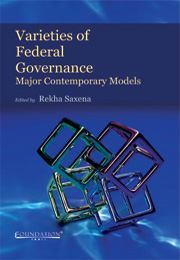Book contents
- Frontmatter
- Contents
- List of Contributors
- Foreword
- Acknowledgements
- Introduction
- I Theoretical and Comparative Dimensions
- II Presidential Federal Systems
- III Commonwealth Parliamentary Federations
- IV Non-Commonwealth Parliamentary Federations in Afro-Asia
- V European Parliamentary Federations
- VI Devolutionary Systems
- VII Supranational Confederalism/Federalism?
Foreword
Published online by Cambridge University Press: 05 June 2012
- Frontmatter
- Contents
- List of Contributors
- Foreword
- Acknowledgements
- Introduction
- I Theoretical and Comparative Dimensions
- II Presidential Federal Systems
- III Commonwealth Parliamentary Federations
- IV Non-Commonwealth Parliamentary Federations in Afro-Asia
- V European Parliamentary Federations
- VI Devolutionary Systems
- VII Supranational Confederalism/Federalism?
Summary
At the end of the Second World War, there were only four functioning federations in the world – the United States, Switzerland, Canada and Australia. Today, there are some twenty-five to thirty federations, and federalism is being actively discussed in perhaps another half dozen countries. In addition, the European Union has emerged as one of the most ambitious and remarkable political innovations of the last half century – one with increasingly federal features and an active debate around federalism.
This proliferation of federations has been driven by a variety of factors. Foremost must be democratization. Germany and Austria returned to federalism with their return to democracy. Mexico, Brazil and Argentina became truly functioning federations with the end of one party or military rule. The death of Franco in Spain and the end of Apartheid in South Africa both uncorked democratic forces that resulted in those countries adopting what are effectively federal structures. A second factor was the end of the British Empire – India, Pakistan, Malaysia, and Nigeria all emerged with federal structures on achieving independence. We have also seen the rise of identity politics and regional or communitarian stresses which have pushed Belgium into federalism and Italy well along the road in that direction, and tested a long-established federation such as Canada.
Of course, the story of federalism, like that of democracy more generally, includes failures and setbacks. A number of post-colonial federations that had been cobbled together by departing Imperial powers did not hold together.
- Type
- Chapter
- Information
- Varieties of Federal GovernanceMajor Contemporary Models, pp. ix - xPublisher: Foundation BooksPrint publication year: 2011
- 1
- Cited by



